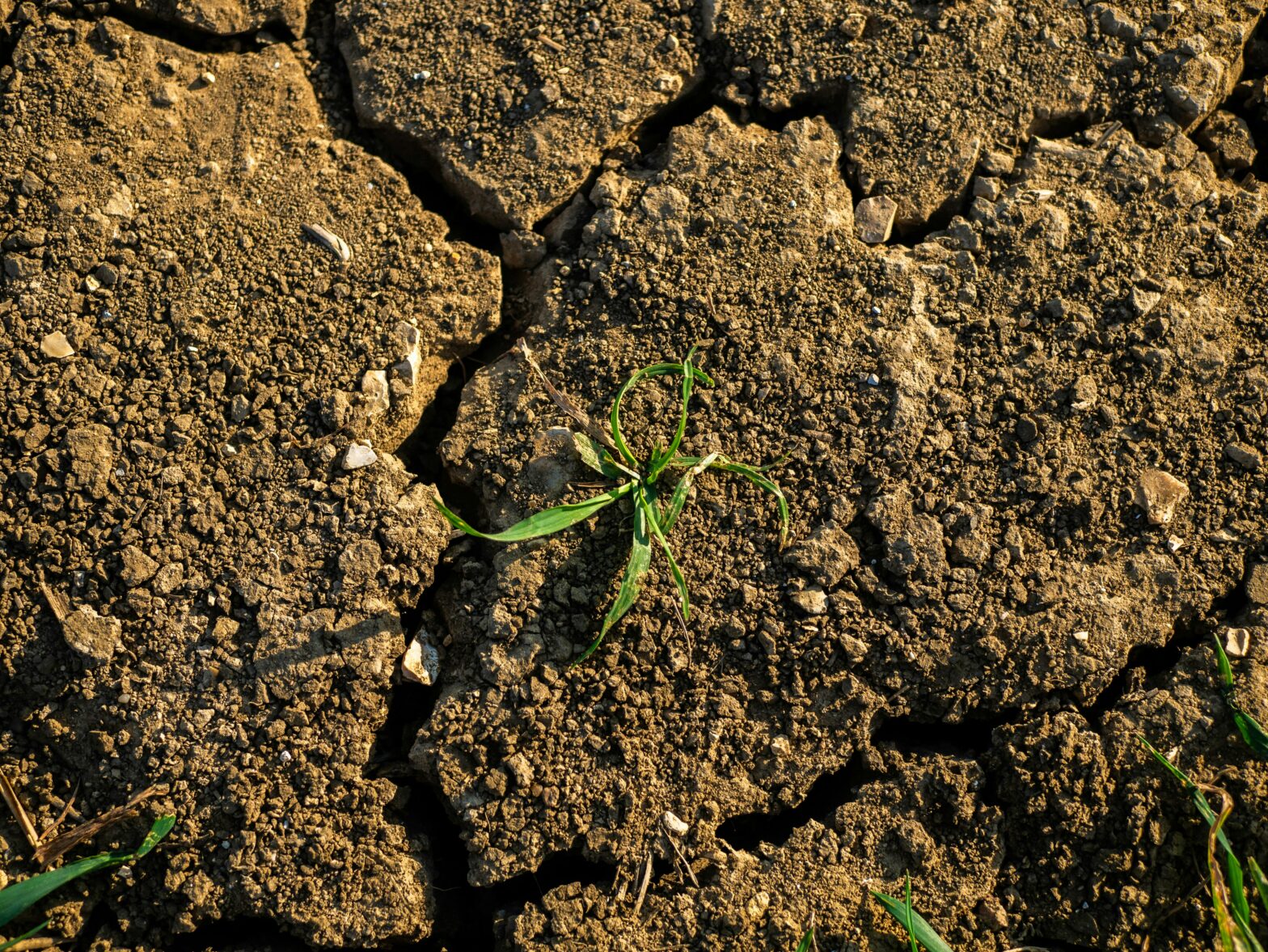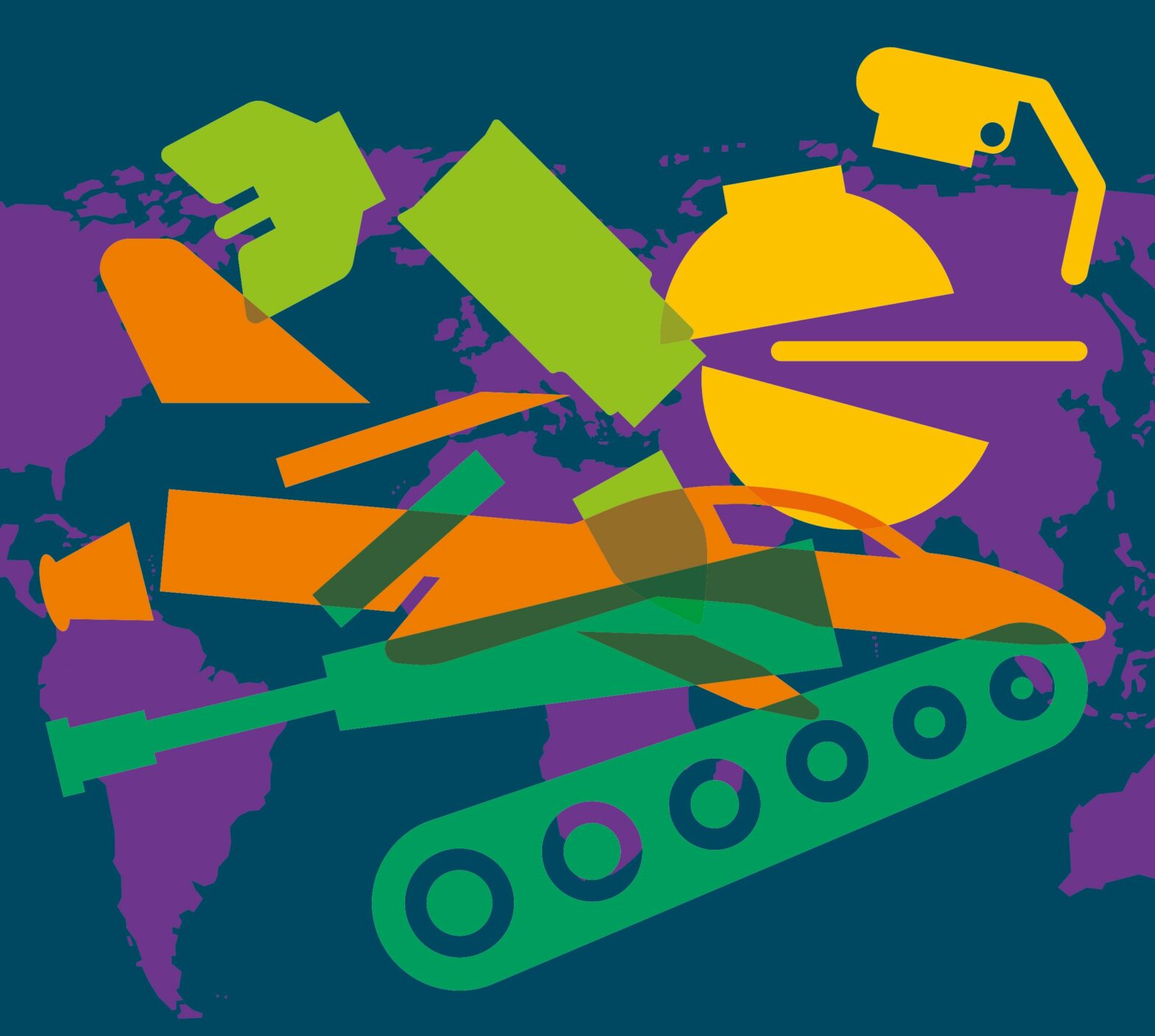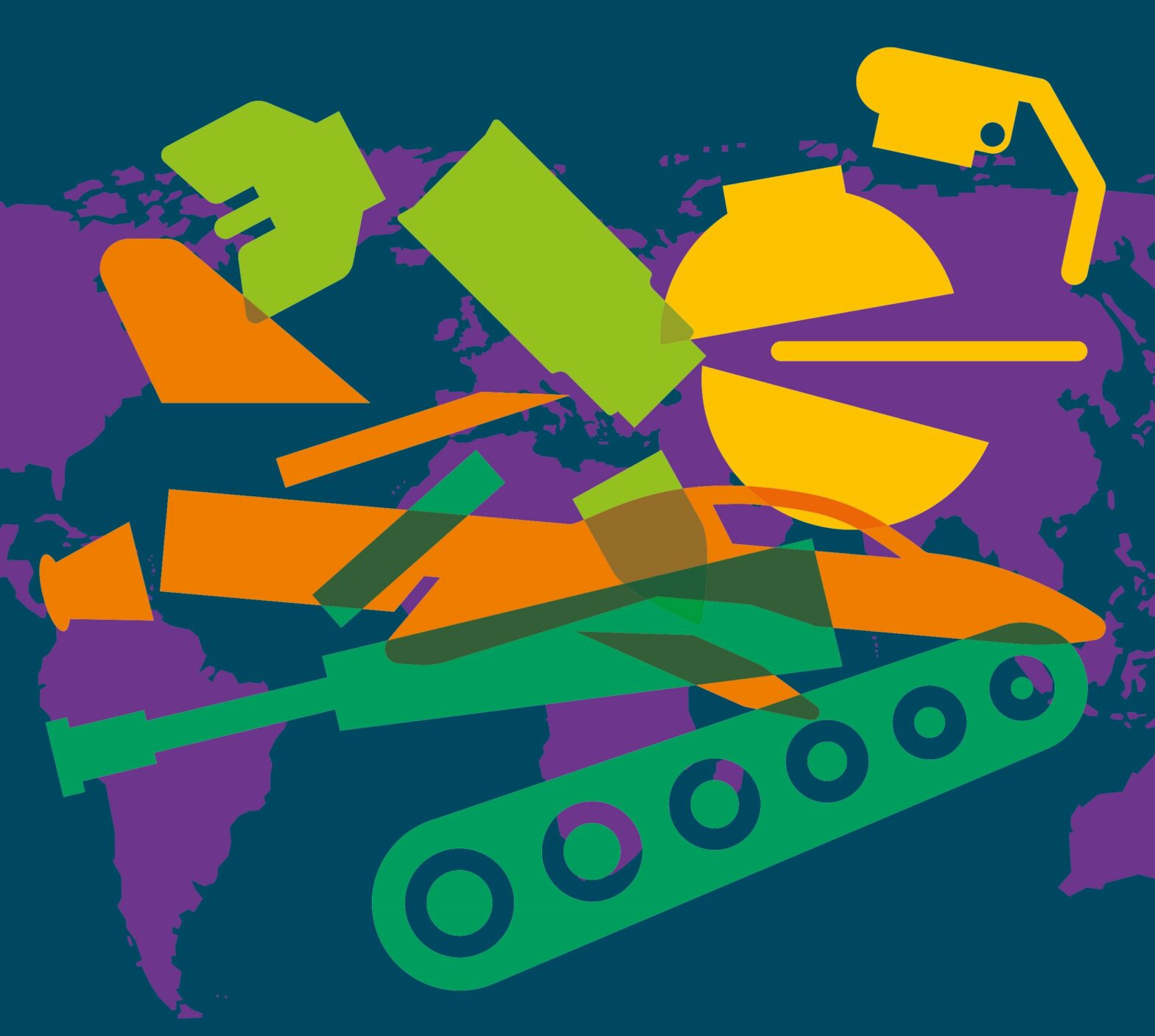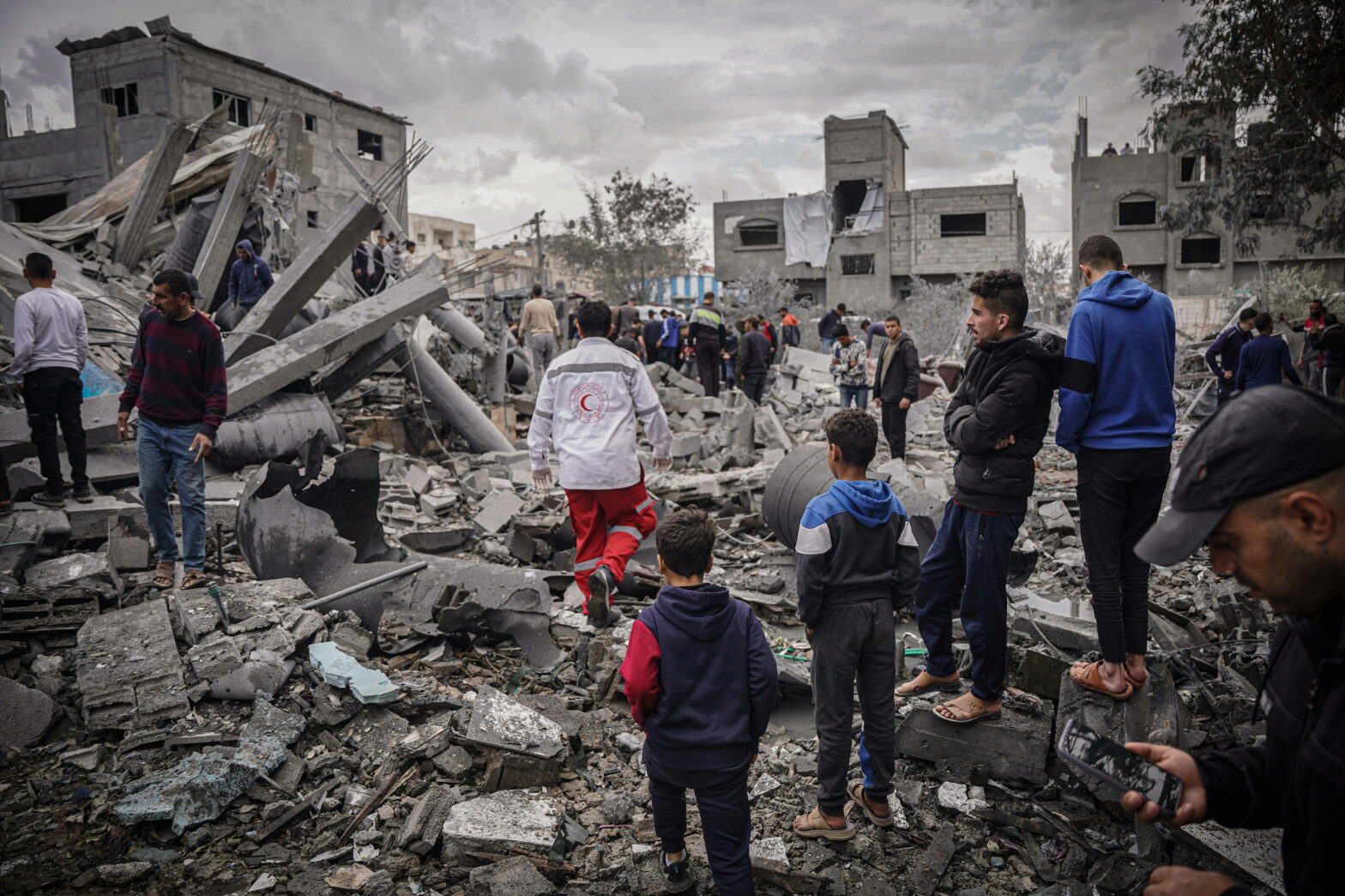Share Twitter Facebook Email Copy URL
Karin Gerster of the Rosa Luxemburg Foundation on the situation in Palestine
This interview was originally published on Rosa Luxemburg Stiftung in German and English
Since Hamas fighters broke into Israel on 7 October and perpetuated brutal violence against Israeli civilians in communities along the border with Gaza, Israeli forces have responded with an unprecedented assault on the entire Gaza Strip. Thousands of Palestinian civilians have been killed in three weeks of near-constant bombing, with no end in sight. Meanwhile, settler attacks on Palestinians have increased in the West Bank, following months of escalation prior to 7 October.
As calls for a ceasefire mount, the situation for people on the ground has become untenable, and prospects for a peaceful future in the region grow dimmer by the day. Katja Herrmann, head of the Rosa Luxemburg Foundation’s West Asia Unit, spoke with Karin Gerster, director of the foundation’s office in Ramallah, about the reality of the war in Gaza and the responsibility of the Left in the face of such a brutal conflict.
You have been working on as well as in Palestine for many years and witnessed various crises on the ground. How surprised were you when the escalation that began on 7 October with the mass killing of Israeli civilians by Hamas?
Like many others, I was extremely shocked. The atrocities against Israeli civilians are inexcusable. Since the rise of the new far-right government in Israel, accompanied by a surge in militancy among Israeli settlers towards the Palestinian population in the occupied West Bank, the risk of a militant response from Palestinians has also grown. The tension in the air prior to the beginning of the escalation was palpable. As I said, I was shocked and at the same time deeply concerned, because I knew that the response from Netanyahu’s government would mean hell for the people of Gaza.
The level of violence inflicted on Palestinians by Israeli settlers and security forces has steadily increased in recent months. What do you think should have been done to prevent the current escalation?
The US and the EU, especially Germany, should not have spent years merely expressing “grave concern” about Israel’s failure to comply with the Oslo Accords of 1993. Instead, they should have actively endeavoured to bring an end to the Israeli occupation, the blockade of the Gaza Strip, and the construction of illegal settlements. They should have given equal consideration to the interests of the Palestinians and their political representatives.
The geographic and political fragmentation of the Palestinian territories has resulted in significant differences between the West Bank and the Gaza Strip, with a certain degree of separation between the two areas. How does this relationship play out in the current crisis?
Despite the geographic fragmentation and the resulting physical separation, Palestinians are closely connected to each other through their shared history, their shared experiences of displacement and occupation, and their familial ties. Connections to Palestinian Israelis, that is, Palestinians who were not displaced or expelled in 1948, are also strong. This sense of unity and solidarity among them prevails within the population, especially in times of war and violence.
What is the perception of Hamas in the West Bank, where it lacks political power?
Hamas is an Islamist party that emerged from the Egyptian Muslim Brotherhood. It was established in the 1980s by Israeli and US intelligence agencies to weaken the Palestine Liberation Organization (PLO).
Hamas is made up of different political factions and is designated as a terrorist organization by the US and the EU due to its militant offences. It has been the major opponent of Fatah, the party that governs in Ramallah, for many years. President Mahmoud Abbas of Fatah likely postponed the parliamentary elections scheduled for 2021 because there were concerns that he would not win the elections. According to polls, Hamas was narrowly ahead at the time, and a clear election victory for Fatah was uncertain.
Since the beginning of the war, more than 6,000 bombs have been dropped on Gaza, one of the most densely populated areas in the world. To compare, the US drops fewer bombs per year in Afghanistan.
There is growing dissatisfaction and frustration with the authoritarian and corrupt regime of the Palestinian Authority (PA) in Ramallah, led by Mahmoud Abbas. The PA has not yet ceased security cooperation with Israel, as stipulated in the Oslo Accords, making it an accomplice of the occupying power in many Palestinians’ eyes.
There is a risk that Hamas, which has an active militant wing and sees itself as a resistance movement, can exploit criticism of Fatah and the difficult, seemingly hopeless situation in the Palestinian territories. Many young people find Hamas appealing. This is also evidenced by Hamas’ regular victories in student elections at universities in the West Bank, such as Birzeit University in Ramallah and An-Najah University in Nablus. These elections are closely monitored by the Palestinian population and political observers as they are seen as a reflection of the wider political climate.
The Palestinian Left is notoriously weak and often backs radical Islamic forces in times of crisis and war. What do leftist analyses and demands currently look like?
The once strong Palestinian Left has long polled at only about five percent. It has clear demands with regard to the war: an immediate halt to hostilities, the elimination of double standards by the West with regard to Palestinians, an end to the occupation, the implementation of the promised elections, and the establishment of a free and democratic society for all Palestinians, grounded in anti-neoliberal economic principles.
Palestinians refer to the present situation in Gaza, where many hundreds of thousands of people have been ordered to leave for the south, as a new Nakba (the Arabic word for “catastrophe”), harkening back to the displacement and expulsion of the Palestinian population during the establishment of the State of Israel in 1948. What is your assessment of the current situation?
As of 26 October, approximately 1.4 million people in the Gaza Strip are displaced, which is more than half of the total population. The reason for this is the daily bombardments and the destruction of homes and infrastructure. The Israeli military ordered people in the northern part of the strip to move to the south, claiming they would be safe from the shelling there. However, this turned out to be a deadly mistake, as bombings were taking place in the south as well.
A total of 590,000 people have sought refuge in 150 shelters provided by the United Nations Relief and Works Agency for Palestine Refugees (UNRWA). At present, the toll stands at 6,500 casualties, with more than 16,300 injured, the majority of which are women and children.
On the orders of Israeli Defence Minister Yoav Gallant, Gaza has not been able to get fuel for its generators for days. This means that hospitals can no longer function, with 12 hospitals and 46 primary care facilities being forced to cease operations, and bakeries can no longer operate.
The population is starving — there is no water, no food, and no electricity. “We are putting a complete siege on Gaza. There will be no electricity, no food, no water, no gas — everything will be closed. We are fighting against human animals, and we are acting accordingly”, the Israeli defence minister said on 9 October 2023.
The few aid deliveries that have been allowed in so far are a drop in the ocean. Gaza currently needs at least 700 trucks a day to somewhat manage the catastrophic humanitarian situation. Even during the blockade, which began 16 years ago, the situation was alarming, with only 500 trucks per day supplying the Gaza Strip. The events unfolding in Gaza right now, with the support and endorsement of many Western governments, constitute a crime against humanity.
Most Palestinians can understand the unique relationship between Israel and Germany. What they criticize are the double standards of the German government, especially regarding human rights violations and resistance.
What is the situation like for your Palestinian colleagues?
We have a team member who lives in Gaza. She does not know if she will survive the war. We are deeply worried about her and try to keep in daily contact. Our Palestinian colleagues in the West Bank are forced to witness the war on their screens day after day, without being able to do anything.
Since the beginning of the war, more than 6,000 bombs have been dropped on Gaza, one of the most densely populated areas in the world. To compare, the US drops fewer bombs per year in Afghanistan. Failing to distinguish between civilians and combatants or soldiers in war constitutes a breach of international law. This carpet-bombing points to the systematic destruction of Palestinians and Palestinian society in the Gaza Strip.
Meanwhile, in the shadow of the Gaza bombings, the military occupation in the West Bank is expanding. Since 7 October, nearly 5,000 Palestinians have been arrested and placed in Israeli prisons under inhumane conditions. Prisoners are subjected to extreme violence, as reported by relatives and human rights organizations. Their access to electricity, food, and water is minimized or completely cut off.
House demolitions and evictions continue. There are countless roadblocks, and people can no longer move freely. Incidents of settler aggression and violence against Palestinians are increasing daily. The use of firearms is on the rise. Since 7 October, there have been 102 Palestinian fatalities in the West Bank due to military and settler violence.
The German discourse, which for a variety of reasons primarily focuses on the Israeli perspective, is difficult for Palestinians to comprehend, and painful to witness. How do you deal with this challenge as a regional director?
One of my roles is to serve as a bridge between the two perspectives. Most Palestinians can understand the unique relationship between Israel and Germany. What they criticize are the double standards of the German government, especially regarding human rights violations and resistance.
How do you envision the time after the war? What challenges are ahead for you and your work?
To be honest, I find it hard to imagine that at the moment. Right now, all I can say is that an immediate ceasefire needs to be implemented, a humanitarian corridor must be established and secured, and the practice of collective punishment of Palestinians must cease. Once all this madness is over, there needs to be an international inquiry into all the war crimes committed.
Finally, it is important to note that settler colonialism and an illegal occupation do not ensure the security of all people in Israel and Palestine or in the region as a whole. Therefore, it is a logical consequence for all states concerned about security to speak out against military responses, to halt arms shipments, and to advocate for an end to the occupation. Many Palestinians believe that it is possible to coexist with dignity, equal rights, and freedom for all.
Karin Gerster directs the Rosa Luxemburg Foundation’s Office for Palestine and Jordan in Ramallah.



